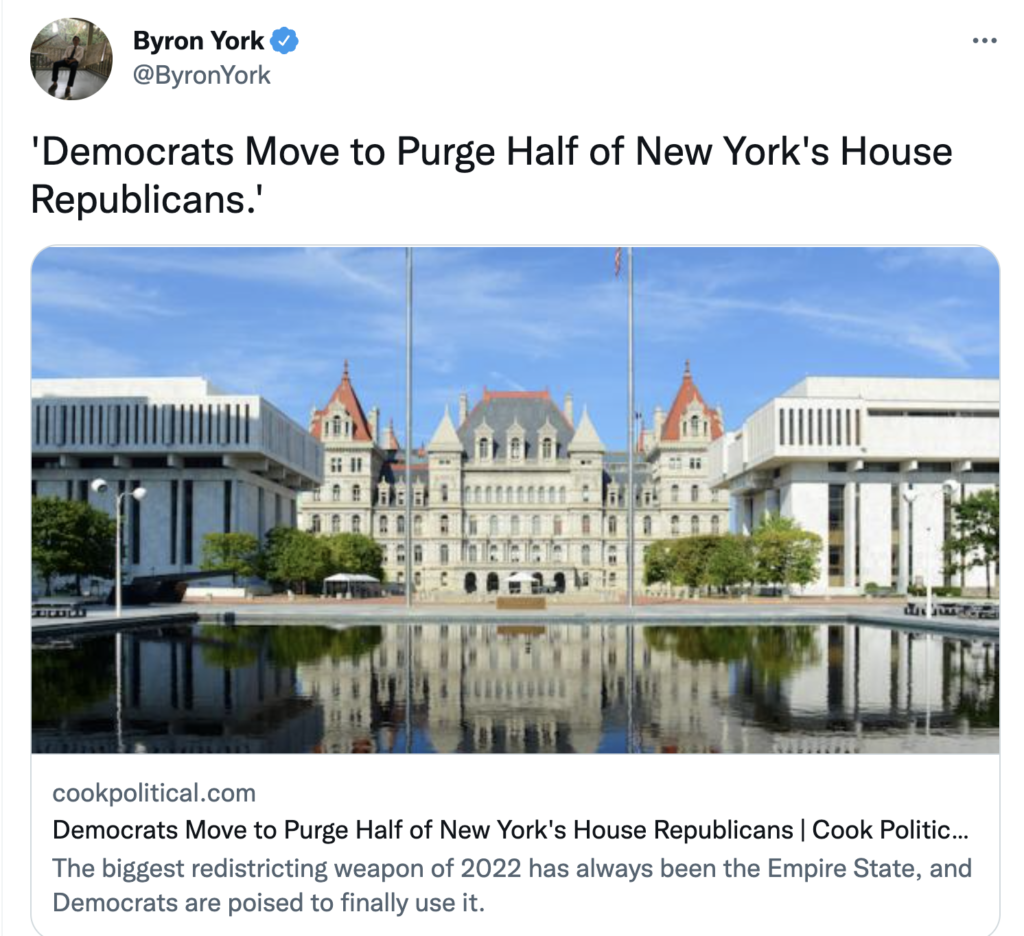It is not hypocritical to play by rules you would prefer were better

As the New York legislature prepares to do the rational thing in the post-Rucho world, Republican pundits are furious that Democrats aren’t playing their designated role as massive suckers:

The much more accurate headline, of course, would be “Democrats Refuse to Unilaterally Disarm after Supreme Court Republicans Refuse to Enforce Constitution in Gerrymandering Cases.” The best equilibrium would be no gerrymandering and equal representation. Democrats on the Supreme Court were willing to enforce the 1st and 14th Amendments against gerrymandering schemes that deny equal representation and disenfranchise voters; each Republican was not. Democrats are to this day willing to pass federal anti-gerrymandering legislation; no Republican supports it. Given this, the only alternative is for Democrats to gerrymander the congressional delegations in states they control, since of all the possible equilibria “Republicans gerrymander, Democrats don’t” is by far the worst and least democratic.
And when I say that Republicans on the Supreme Court refused to enforce the Constitution, I’m not being snarky or hyperbolic. The Court invoked the “political questions” doctrine, invented by the Roberts Court’s spiritual forefather, Roger Taney. That is, the majority in Rucho did not say that the extreme partisan gerrymanders were constitutional; they ruled that it was practically impossible for the courts to enforce the Constitution. As Justice Kagan observed:
At its most extreme—as in North Carolina and Maryland—the practice amounts to “rigging elections.” By drawing districts to maximize the power of some voters and minimize the power of others, a party in office at the right time can entrench itself there for a decade or more, no matter what the voters would prefer. Just ask the people of North Carolina and Maryland. The “core principle of republican government,” this Court has recognized, is “that the voters should choose their representatives, not the other way around.” Partisan gerrymandering turns it the other way around. By that mechanism, politicians can cherry-pick voters to ensure their reelection. And the power becomes, as Madison put it, “in the Government over the people.”
The majority disputes none of this. I think it important to underscore that fact: The majority disputes none of what I have said (or will say) about how gerrymanders undermine democracy. Indeed, the majority concedes (really, how could it not?) that gerrymandering is “incompatible with democratic principles.” And therefore what? That recognition would seem to demand a response. The majority offers two ideas that might qualify as such. One is that the political process can deal with the problem—a proposition so dubious on its face that I feel secure in delaying my answer for some time. The other is that political gerrymanders have always been with us. See ante, at 8, 24. To its credit, the majority does not frame that point as an originalist constitutional argument. After all (as the majority rightly notes), racial and residential gerrymanders were also once with us, but the Court has done something about that fact. The majority’s idea instead seems to be that if we have lived with partisan gerrymanders so long, we will survive.
That complacency has no cause.
But if Republicans refuse make nonpartisan districting a federal rule, the idea that it’s wrong for Democrats to play by existing rules. The logic of York’s argument is that if the Bengals disagree with NFL OT rules and thought they are unfair to the team that loses the coin toss, that they were therefore obligated to simply forfeit the game rather than play under them. This is incredibly stupid. If Republicans want a no-gerrymander equilibrium, they can just take the deal on the table anytime. Until then, Democratic legislators need to play the game under the existing rules, and it’s good that they’re doing so.
…Paul in comments:
The best part of this game is that charges of hypocrisy are absolutely pointless against Republicans. They don’t care and they don’t even pretend to care about being hypocrites about anything and everything.
It’s like hypocrisy isn’t even a meaningful concept to them. Yet a zillion centrist writers think that Democrats should do everything possible to avoid being accused of hypocrisy, even in situations such as this one, where the charge is totally bogus.


